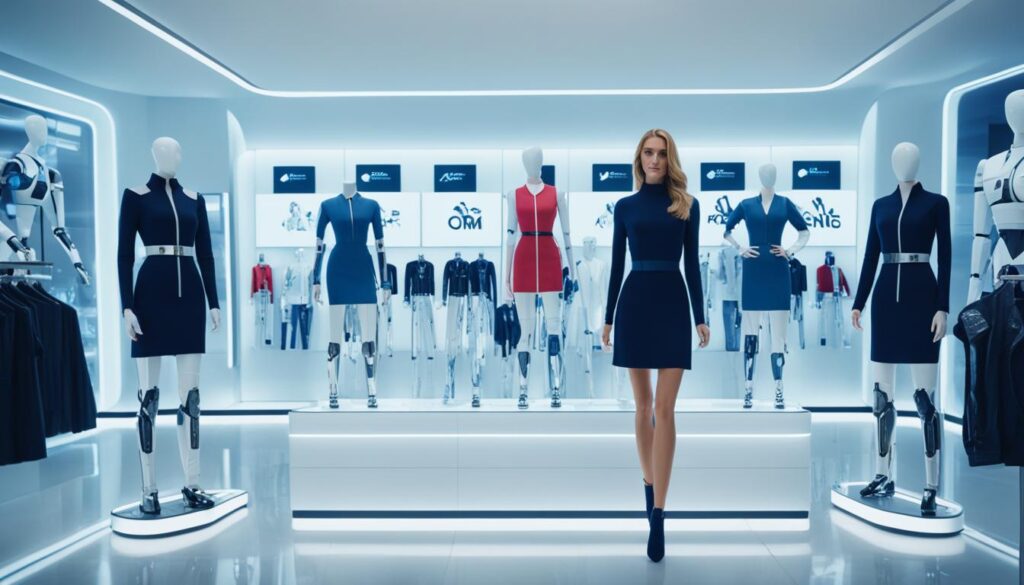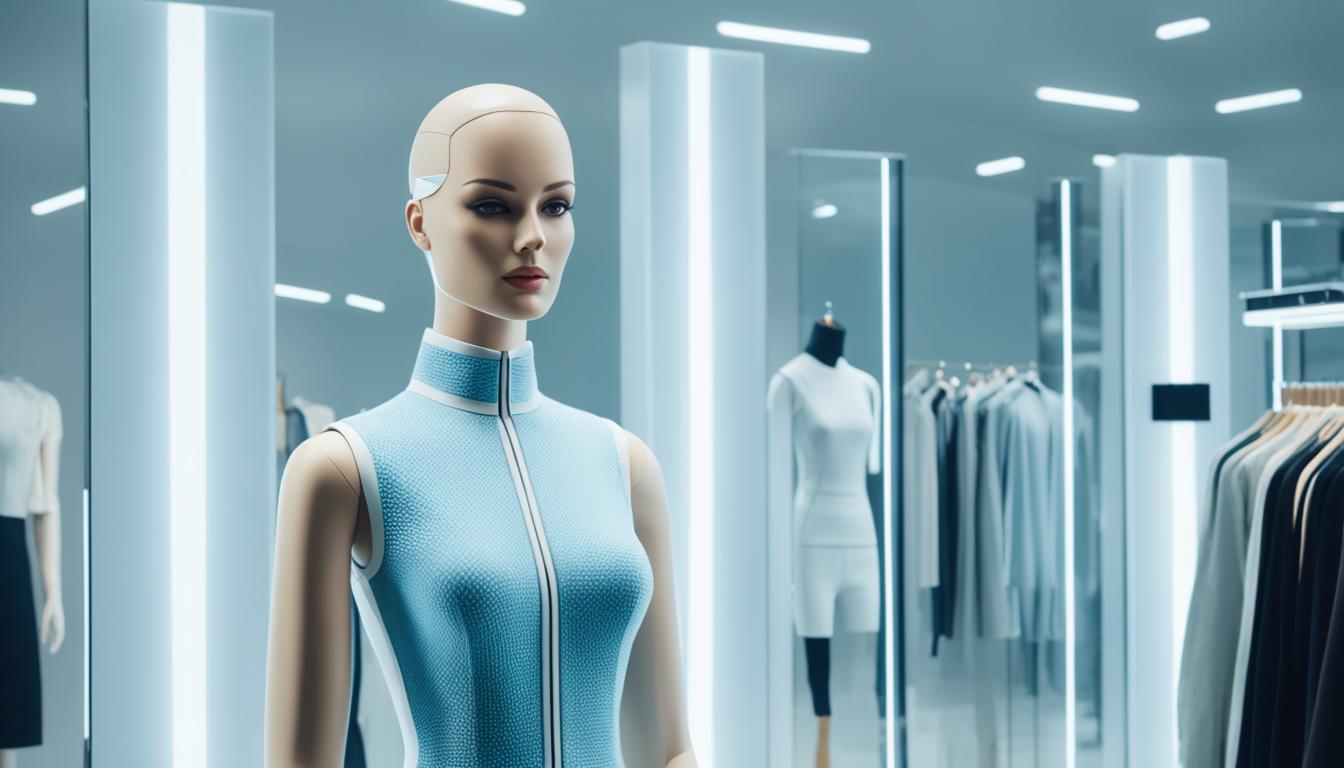Artificial Intelligence (AI) is revolutionizing the fashion industry, transforming retail operations and enhancing efficiency in the world of fashion retail. With its ability to analyze data and provide real-time insights, AI technology is driving significant changes in the way fashion houses operate. From optimizing resource utilization and eco-friendly design creation to trend prediction, effective customer engagement, and revenue boost, AI is reshaping the fashion industry for the better. Its adoption has seen remarkable growth, indicating its indispensability in fashion retail operations.
Key Takeaways:
- AI technology is transforming fashion retail operations, leading to improved efficiency and customer experiences.
- The adoption of AI in the fashion industry is on the rise, with significant market growth projected.
- AI enables fashion houses to optimize resources, create eco-friendly designs, and predict trends for better performance.
- The fashion industry faces numerous challenges, and AI provides solutions across various aspects of the fashion lifecycle.
- Benefits of AI in fashion include personalized customer experiences, optimized inventory management, and enhanced fashion analytics.
The Rise of AI in the Fashion Industry
Artificial Intelligence (AI) has seen significant growth in the fashion industry, transforming every stage of the fashion lifecycle. From design to delivery, AI is revolutionizing how retailers conceptualize, create, promote, and distribute products. The integration of AI-driven technologies and strategies has led to increased efficiency, improved customer engagement, and enhanced revenue generation within the fashion industry.
One of the notable AI trends in the fashion sector is the adoption of AI solutions for retail efficiency. Retailers are leveraging AI to streamline their operations, automate repetitive tasks, and optimize resource allocation. By automating processes such as inventory management, supply chain logistics, and customer service, fashion businesses can operate more efficiently, reducing costs and improving overall performance.
Fashion industry automation is another key aspect of AI’s influence. AI enables the automation of various operations, including personalized marketing and advertising campaigns, inventory forecasting, and pricing strategies. By harnessing the power of machine learning and data analytics, AI systems can analyze vast amounts of data, identify patterns, and make accurate predictions, assisting fashion businesses in making informed decisions.
AI-driven retail strategies are also driving significant improvements in the fashion industry. By using AI-powered algorithms and predictive analytics, fashion retailers can optimize their product assortments, tailor recommendations for individual customers, and create personalized shopping experiences. This not only enhances customer satisfaction but also increases sales and boosts brand loyalty.
The rise of AI in the fashion industry showcases its potential for driving sustainable growth and fostering innovation. Fashion businesses that embrace AI technologies and strategies are better equipped to stay competitive, adapt to changing market trends, and cater to the evolving needs of their customers. With its transformative capabilities, AI continues to shape the future of the fashion industry, positioning it for continued success and evolution.

In the image above: AI-driven technology enhancing the fashion retail experience.
AI Applications in the Fashion Industry
| Application | Functionality |
|---|---|
| Personalized Recommendations | AI algorithms analyze customer data to provide tailored product recommendations, enhancing customer engagement and increasing sales. |
| Trend Analysis | AI systems analyze fashion trends, consumer preferences, and social media data to predict future trends and inform design decisions. |
| Virtual Try-On | AI-powered virtual try-on solutions enable customers to digitally try on clothes and accessories, enhancing the online shopping experience and reducing returns. |
| Inventory Optimization | AI algorithms analyze demand patterns, inventory levels, and sales data to optimize inventory management, reducing stockouts and excess inventory. |
| Supply Chain Management | AI-driven supply chain management systems improve transparency, efficiency, and sustainability by optimizing logistics, sourcing, and production processes. |
The Need for AI in the Fashion Industry
The fashion industry faces numerous challenges that demand innovative solutions to stay competitive and meet customer expectations. In this dynamic market, the integration of AI technologies is essential to overcome these challenges and drive growth. By leveraging the power of AI, fashion businesses can optimize various aspects of their operations, including e-commerce, inventory management, and customer experiences.
E-commerce Optimization with AI
With the rise of online shopping, e-commerce optimization has become crucial for fashion retailers. AI plays a vital role in enhancing the online shopping experience through personalized product recommendations, personalized advertising, and intelligent search functionality. By analyzing customer preferences, browsing behavior, and purchase history, AI algorithms can accurately predict and suggest fashion items that align with individual tastes and preferences. This level of personalization not only improves customer satisfaction but also increases conversion rates and sales.
Machine Learning in Fashion Retail
Machine learning is another area where AI is driving significant advancements in the fashion industry. By analyzing vast amounts of data, machine learning algorithms can identify patterns, trends, and unique insights that human analysts may overlook. This enables fashion businesses to make data-driven decisions regarding inventory management, pricing strategies, demand forecasting, and marketing campaigns. Machine learning algorithms can also detect and prevent fraud, ensuring the security and authenticity of fashion products.
“AI provides fashion businesses with the tools they need to effectively navigate the ever-changing landscape of the fashion industry. By optimizing e-commerce operations and harnessing the power of machine learning, fashion retailers can cater to individual customer preferences, optimize their inventory, and make data-driven decisions for sustainable growth.”
Moreover, AI-powered chatbots and virtual assistants are transforming customer service in the fashion industry. These intelligent virtual agents can quickly and accurately respond to customer inquiries, provide personalized recommendations, and resolve common issues, enhancing the overall customer experience and increasing customer loyalty.
The Role of Sustainability
As sustainability becomes an increasingly important concern for the fashion industry, AI technology offers valuable solutions to reduce waste and promote sustainable practices. By analyzing data on consumer behavior and environmental impact, AI algorithms can optimize supply chains, reduce overproduction, and minimize carbon footprint. With AI’s ability to identify and predict fashion trends, retailers can ensure they produce clothes that align with consumer demand, reducing the need for excessive inventory and unsold items.

By embracing AI, the fashion industry can overcome challenges, improve efficiency, and drive innovation. Whether it’s optimizing e-commerce operations, leveraging machine learning, or promoting sustainability, AI is a powerful tool that transforms fashion retail by providing data-driven insights, enhancing customer experiences, and enabling businesses to stay competitive in a rapidly evolving market.
Benefits of AI in Fashion
AI offers numerous benefits to the fashion industry. It enables personalized experiences for customers by analyzing data and providing personalized recommendations. AI optimizes inventory management, ensuring the availability of popular fashion items and reducing financial losses from excess inventory. In the design process, AI assists fashion designers by generating innovative concepts and predicting consumer preferences. AI also enhances fashion analytics, security, and customer engagement. By leveraging AI-driven technologies, fashion businesses can improve efficiency, reduce costs, and stay at the forefront of industry trends, ultimately boosting their overall performance.
Conclusion
The integration of Artificial Intelligence (AI) has revolutionized the fashion industry, transforming retail operations and driving efficiency like never before. With AI-powered technologies, fashion brands are reshaping the customer experience by introducing innovative solutions such as fashion virtual try-on and fashion voice commerce.
AI-driven automated product tagging has streamlined inventory management, allowing fashion businesses to optimize pricing and sales strategies and deliver more personalized experiences to their customers. In addition, dynamic pricing strategies enabled by AI are helping fashion retailers stay competitive in a rapidly evolving market.
Looking ahead, the fashion industry can anticipate further advancements in AI technology, including augmented reality applications, personalized experiences, and enhanced supply chain management. By embracing AI, fashion businesses can maintain their competitive edge, enhance customer satisfaction, and drive innovation in the ever-changing fashion landscape.
FAQ
How is AI transforming the fashion industry?
AI is revolutionizing retail operations in the fashion industry by optimizing resource utilization, providing real-time insights, enhancing efficiency, improving customer experiences, and driving sustainability.
How is AI being integrated into the fashion industry?
AI is being integrated into the fashion industry through the adoption of AI-driven technologies and strategies, which include AI solutions for retail efficiency, automation of fashion industry operations, and the implementation of AI-driven retail strategies.
What challenges does AI address in the fashion industry?
AI addresses challenges such as rapidly changing trends, inventory management, personalization, sustainability, forecasting, counterfeiting, marketing and advertising, and more, helping fashion businesses stay competitive and meet customer expectations.
What benefits does AI offer to the fashion industry?
AI offers numerous benefits to the fashion industry, including personalized customer experiences, optimized inventory management, innovative design concepts, enhanced fashion analytics and security, and improved customer engagement and satisfaction.
How is AI shaping the customer experience in the fashion industry?
AI technologies are shaping the customer experience in the fashion industry through innovations such as fashion virtual try-on and voice commerce, as well as AI-driven solutions like automated product tagging and dynamic pricing strategies.
What can the fashion industry expect from the future development of AI?
In the future, the fashion industry can expect further advancements in areas such as augmented reality, personalized experiences, and supply chain management, as AI continues to evolve and drive innovation.








